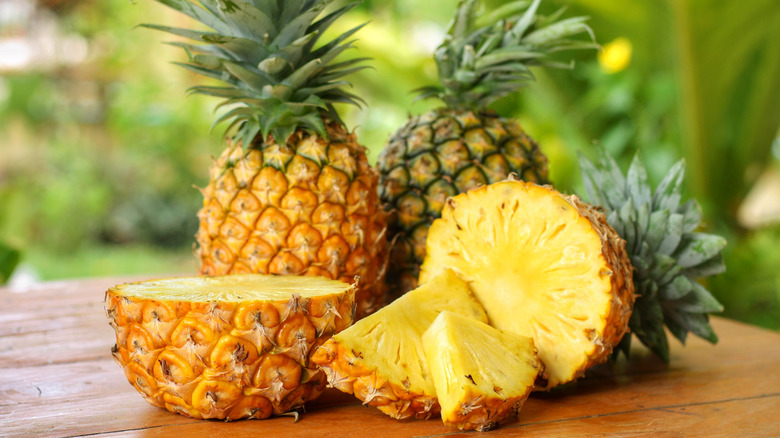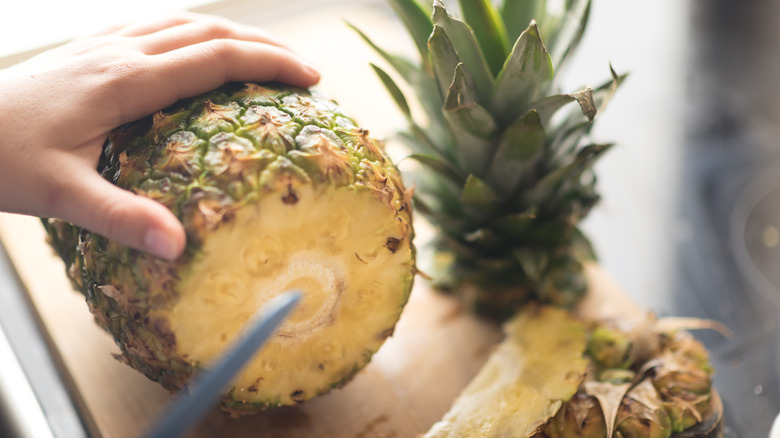What You Should Know Before Eating Another Pineapple
There's nothing better than relishing in a slice of pineapple on a hot summer day by the pool or at a picnic. They can even be a delicious accompanying ingredient to shrimp in a grilled kabob, or even baked and enjoyed in a delectable pineapple upside down cake. Pineapples, which are native to the Caribbean, Brazil, and Paraguay and are a major Hawaiian export (via WebMD), have some incredible health benefits, however, eating one is also not without drawbacks.
Eat This, Not That reports that pineapple contains bromelain. When it comes to health benefits, the enzyme acts as an anti-inflammatory, which alleviates pain for people with conditions like arthritis and gum disease as well as helps heal injuries like bruises.
"Bromelain contains anti-inflammatory properties that have been used to reduce pain and swelling from burns, joint pain, and other inflammatory diseases," stated registered dietitian Jonathan Valdez, as quoted by Eat This, Not That.
Pineapples have some sweet health benefits
There are myriad other health benefits that come from eating pineapple, including lowering blood pressure, as bromelain reduces blood clotting and encourages the creation of blood cells. In addition to bromelain, pineapple also contains manganese, which can help with bone strength (via Eat This, Not That). Additionally, with only 70 to 85 calories per cup, eating pineapple, like other fruits, can help with weight loss (via WebMD).
"People tend to eat fewer calories overall if they consume several cups of fruits and vegetables every day as a part of a well-balanced diet," said chef Julie Andrews, RDN (via Everyday Health).
Pineapples are also rich in vitamin C, and eating one cup will give you over 100% of your daily necessary amount (via Eat This, Not That), which also has valuable anti-inflammatory properties that can reduce joint pain and help prevent heart disease (via Eat This, Not That).
Finally, eating pineapple might help aid in digestion, particularly in people with IBD, as the anti-inflammatory properties of bromelain can potentially ease symptoms. However, as Valdez points out, a conclusive link between bromelain and IBD treatment is yet to be established (via Eat This, Not That).
Pineapple's not-so-sunny side
While pineapple may be delicious, nutritious, and as we've discovered, chock-full of potential health benefits, eating a pineapple isn't all fun and games. There are some downsides to consuming the fruit, especially when eaten in excess.
"Eating too much can cause tenderness of the mouth, lip, and tongue," said Valdez (via Eat This, Not That).
Fortunately, there is a way to avoid these uncomfortable symptoms. Erin Palinski-Wade, RD, recommends cooking or grilling pineapple to break down the bromelain enzyme or to steer clear of the parts of the pineapple near the stem and the core, as these contain the highest levels of bromelain (via Eat This, Not That).
In addition to potentially painful mouth sensations, pineapple can have some negative side effects on your health. The fruit can lead to diarrhea and vomiting, which occurs in people with bromelain sensitivities, or even hives and mouth swelling, as pineapples are a source of latex. Therefore, those with latex allergies should avoid the fruit (via Eat This, Not That).


